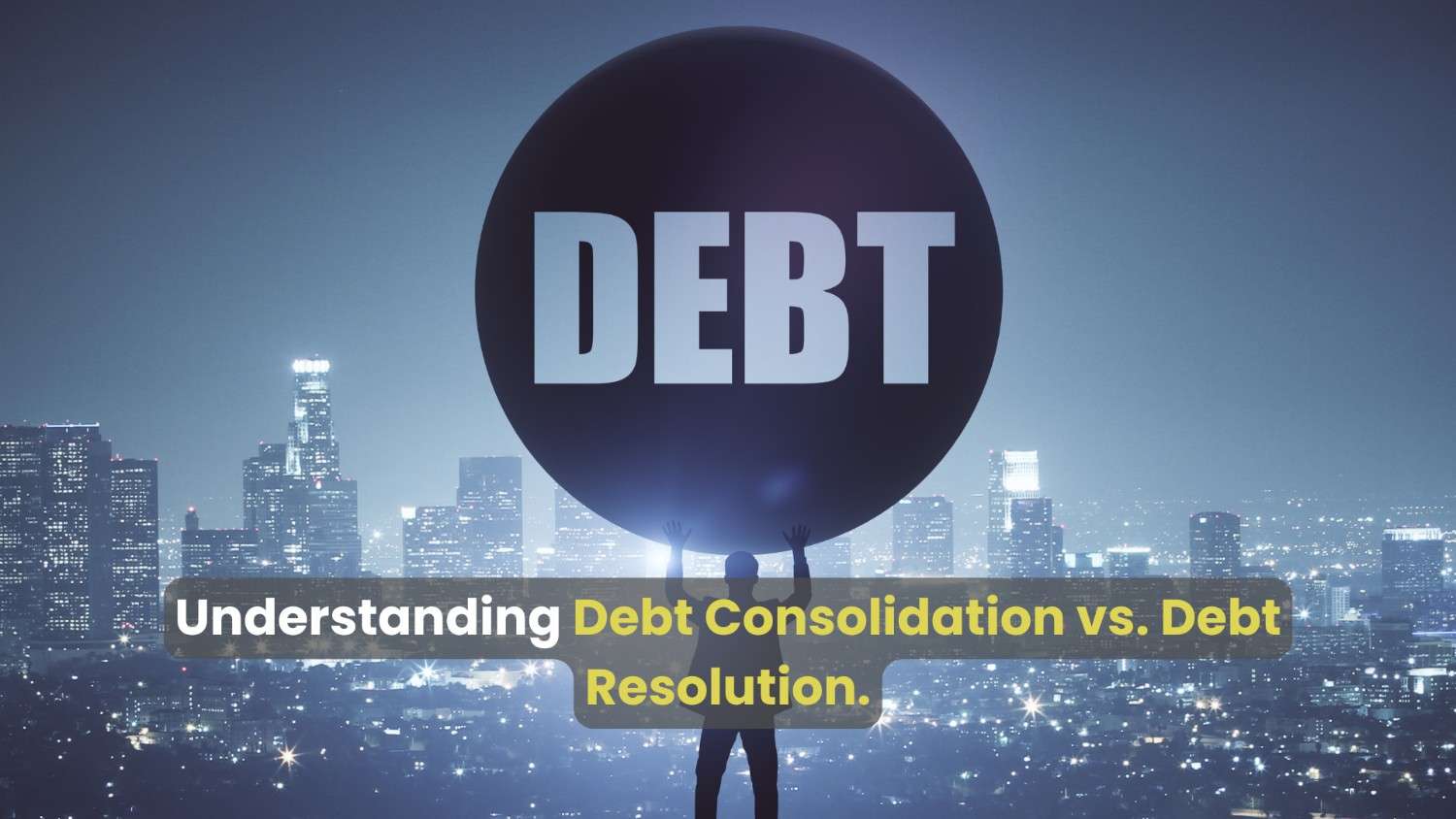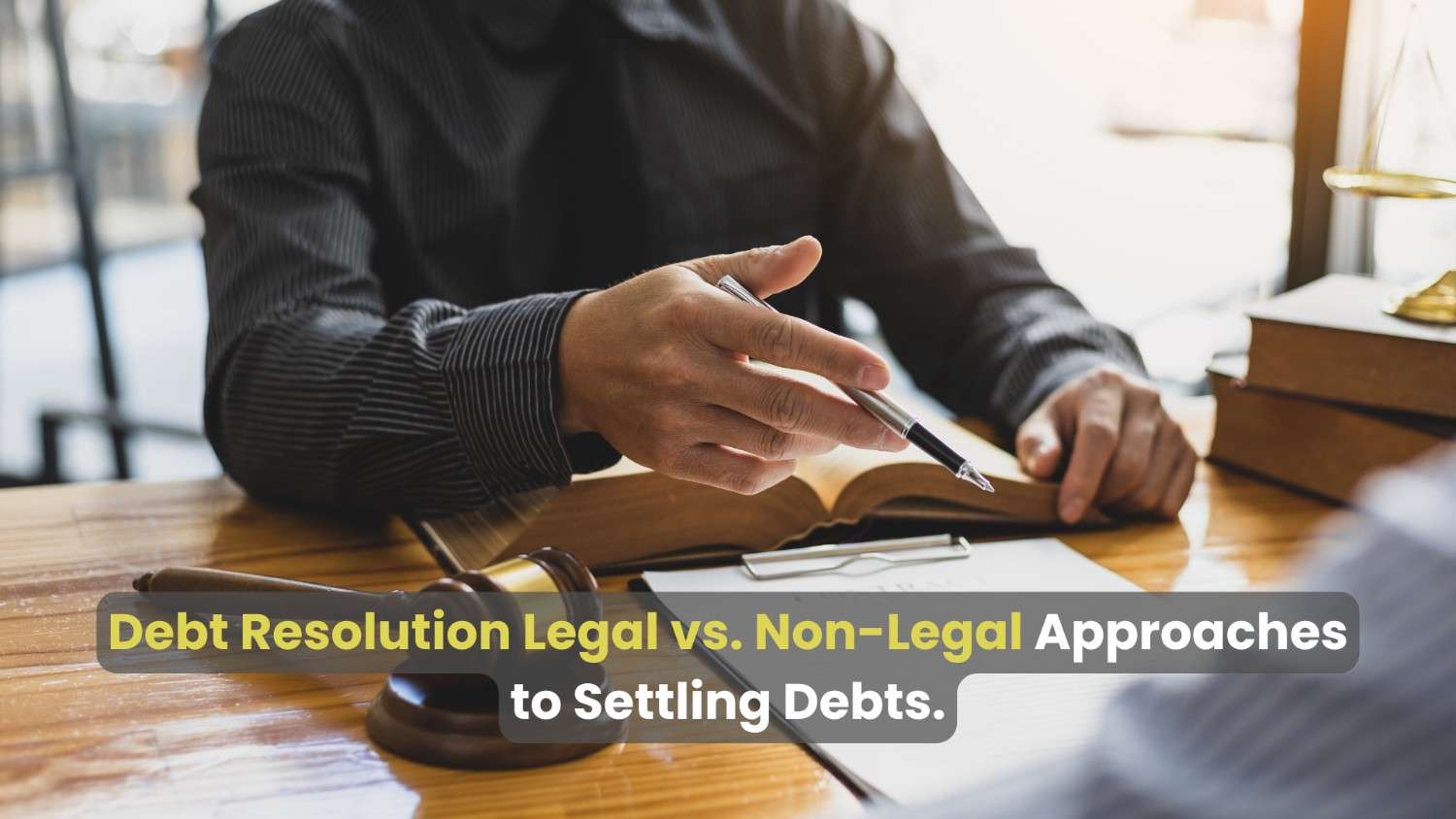· Debt Resolution · 6 min read
Debt Consolidation vs. Debt Resolution: Key Differences & Which Option is Right for You
Confused about debt consolidation vs. debt resolution? Learn the key differences, pros and cons, and how to choose the best option for reducing your debt and improving financial health

When life gets overwhelming with mounting bills and constant creditor calls, finding a solution to handle debt becomes a priority. If you find yourself in a financial mess, it’s crucial to understand your options. Two popular options are debt consolidation and debt resolution. Both serve to reduce debt, but they differ significantly in approach, long-term impact, and suitability for your situation. In this article, we’ll break down each method, helping you decide which one aligns best with your financial needs.
What is Debt Consolidation?
Debt consolidation is a process that involves combining multiple debts into a single loan, ideally with a lower interest rate and more favorable repayment terms. This can simplify your debt management and make it easier to track payments.
Types of Debt That Can Be Consolidated
Most unsecured debts—such as credit card balances, medical bills, and personal loans—can be consolidated. Secured debts, like mortgages or car loans, are typically not included in debt consolidation.
Pros and Cons of Debt Consolidation
Pros:
Simplified Payments: Instead of managing multiple bills, you’ll only make one payment.
Lower Interest Rates: If you qualify for a good rate, you could save money over time.
Improved Cash Flow: A consolidated loan can lower your monthly payment.
Cons:
Risk of More Debt: If you don’t change your spending habits, you might rack up more debt.
Fees: Some debt consolidation loans may come with high fees.
Potential for a Longer Repayment Period: Although the monthly payments are smaller, you might end up paying more in the long run if the loan term is extended.
What is Debt Resolution?
Debt resolution (also known as debt settlement) is the process of negotiating with creditors to reduce the amount of debt you owe, typically by settling for a lesser amount than what’s originally owed.
Types of Debt Involved in Debt Resolution
This option is typically used for unsecured debts like credit cards, personal loans, medical bills, and payday loans. However, it’s not suitable for secured debts, such as home or auto loans.
Pros and Cons of Debt Resolution
Pros:
Debt Reduction: You may end up paying less than what you owe.
Fast Solution: Compared to other debt strategies, debt resolution can be faster.
Debt Freedom: After settling, the debt is typically marked as “paid in full.”
Cons:
Damage to Credit Score: The process can negatively affect your credit rating.
Tax Implications: The amount of debt forgiven could be considered taxable income.
Fees: Debt settlement services usually charge fees that are a percentage of the debt settled.
Key Differences Between Debt Consolidation and Debt Resolution
When comparing debt consolidation and debt resolution, there are a few key distinctions that could help you decide which method is right for you.
Debt Consolidation Process vs. Debt Resolution Process
Debt consolidation involves taking out a new loan to pay off existing debts. You repay the new loan in installments. Debt resolution, on the other hand, involves negotiating with creditors to pay less than you owe, usually in a lump sum.
Impact on Credit Score
Debt consolidation has a less damaging effect on your credit score, as it keeps your existing accounts open and just combines the balances. Debt resolution, however, can cause a significant drop in your credit score due to missed payments and settled accounts.
Payment Terms Comparison
Debt consolidation offers a clear, structured repayment plan, while debt resolution might involve lump-sum payments after successful negotiation, with terms varying greatly depending on the settlement agreement.
Eligibility for Both Options
Debt consolidation is typically available to those with decent credit who can qualify for a loan, while debt resolution is often used by individuals with substantial debt and poor credit who cannot afford to pay off the full balance.
Which Option Is Right for You?
Choosing between debt consolidation and debt resolution depends largely on your financial situation and goals.
Factors to Consider Before Choosing
Amount of Debt: If you have small amounts of debt, consolidation might be the right choice. For large amounts of unsecured debt, resolution could help you reduce what you owe.
Credit Score: If you have a good credit score, consolidation could preserve it. If your credit score is already low, debt resolution might be worth considering.
Financial Stability: Consolidation may be better if you have a stable income and can afford regular payments. Debt resolution could help if you’re struggling to make minimum payments.
When Debt Consolidation Makes More Sense
If you want to simplify your finances and avoid debt settlement’s impact on your credit score, consolidation is likely the better choice.
When Debt Resolution May Be a Better Option
If you’re overwhelmed by debt and can’t afford to pay the full balance, debt resolution can provide immediate relief by reducing the total amount owed.
Understanding the Long-Term Impact
Both debt consolidation and debt resolution can lead to financial freedom, but they impact your future financial health differently.
Financial Recovery and Credit Score Improvement
Debt consolidation can help improve your credit score over time, especially if you stay on top of payments. Debt resolution, while offering an immediate reduction in debt, often results in a temporary drop in your score.
What Happens After Completing Either Process?
Once you’ve paid off your debt through consolidation or resolution, it’s important to continue managing your finances responsibly. Debt consolidation offers an opportunity to rebuild credit, while debt resolution may leave you with a negative credit history but a fresh financial start.
Common Mistakes to Avoid
When considering either of these options, it’s essential to be aware of common pitfalls that can hurt your financial future.
Common Misconceptions About Debt Solutions
Some people think debt consolidation is a cure-all, but it doesn’t eliminate your debt; it only reorganizes it. Others may assume debt resolution will instantly fix their credit, but it could hurt their score significantly.
How to Avoid Making the Wrong Choice
To avoid mistakes, make sure to research both options thoroughly. Speak with a financial advisor to determine which solution will work best for your unique financial situation.
Conclusion
Debt consolidation and debt resolution are two different approaches to managing and reducing debt. Debt consolidation simplifies payments and can improve your credit score, while debt resolution provides relief from debt but can negatively impact your credit. It’s crucial to assess your financial situation, goals, and potential long-term effects before choosing the right path. For more insights and professional debt management services, check out eResolution, a trusted platform for resolving financial challenges.
FAQs
**Can both options be used together?
**No, you cannot consolidate and resolve the same debt at the same time.**How long does debt consolidation take?
**The process can take anywhere from a few months to several years, depending on the loan term.**Will debt resolution damage my credit score?
**Yes, debt resolution can cause a temporary dip in your credit score.**What types of debts qualify for debt resolution?
**Typically, unsecured debts like credit card balances, personal loans, and medical bills are eligible.**Can I handle debt consolidation or resolution on my own?
**Yes, both options can be managed independently, but professional assistance can help you navigate the process.

.Dceoa-1b.jpeg)

.DVCWSTd1.jpeg)